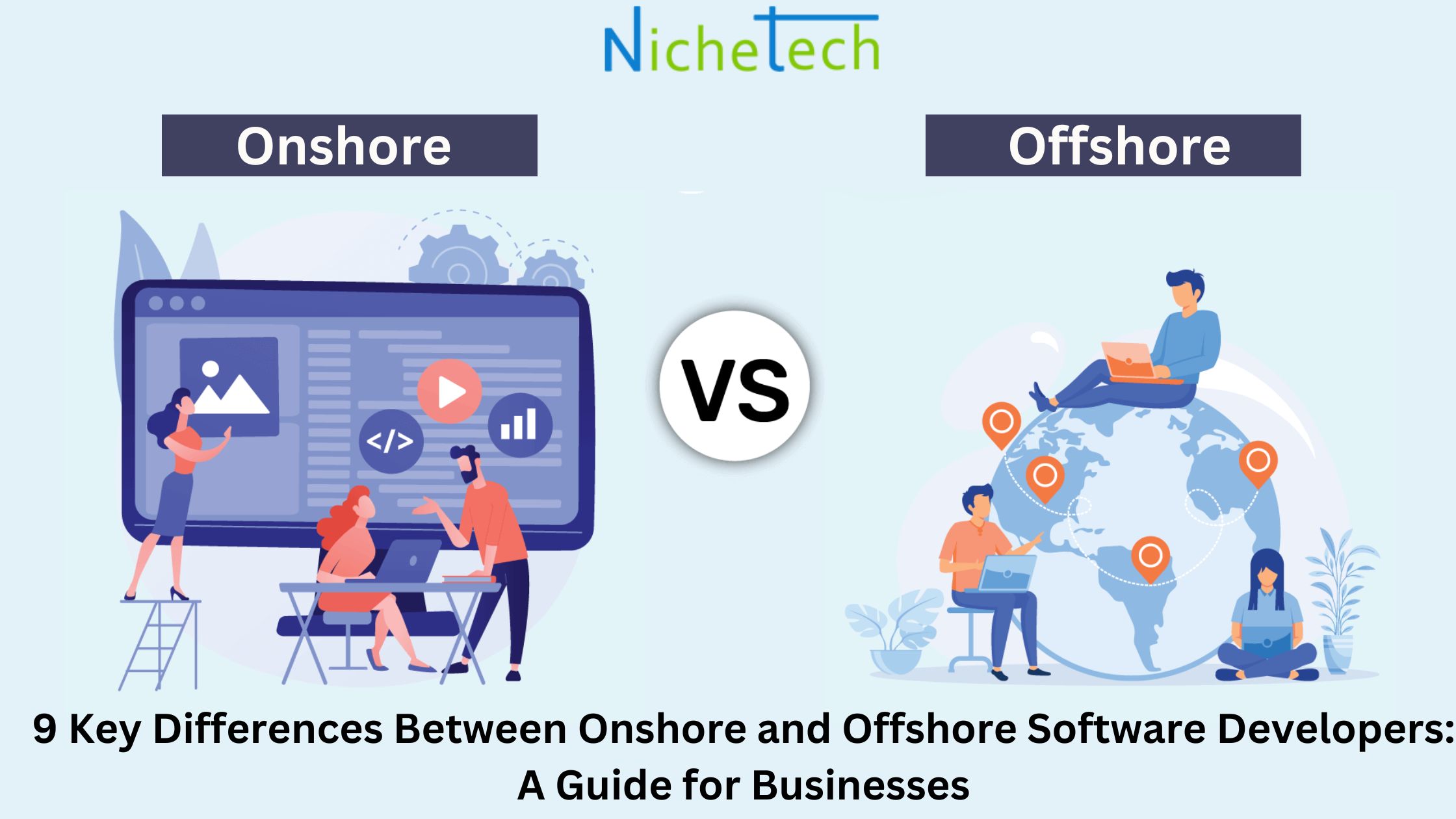Choosing between onshore and offshore software developers is a major decision for businesses looking to build or enhance their digital products. Each option comes with distinct advantages and challenges, influencing cost, communication, and overall project outcomes. Understanding the key differences between onshore and offshore development can help you make an informed choice that aligns with your goals. Here’s a look at nine critical distinctions between onshore and offshore software developers.
1. Cost Efficiency
One of the most prominent differences between onshore and offshore developers is cost. Hiring onshore developers—those located within your home country—tends to be more expensive due to higher labor costs, especially in regions like North America and Western Europe. Offshore developers, located in countries with lower labor costs such as India, the Philippines, or Eastern Europe, can offer significant savings.
While offshore development can be budget-friendly, it’s essential to weigh the potential trade-offs in quality and communication, which can affect overall costs in the long run.
2. Communication and Time Zone Alignment
Onshore developers share the same or similar time zones, making real-time communication much easier and reducing delays in responses. With offshore developers, time zone differences can create challenges in scheduling meetings and real-time collaboration, leading to potential communication delays.
However, many offshore teams now offer flexible working hours to overlap with client schedules, making it easier to collaborate despite time differences.
3. Cultural Understanding and Alignment
Onshore developers usually have a strong understanding of the cultural context and expectations of your business, which can be especially important for projects with user-facing elements. This cultural alignment helps in grasping nuances related to user preferences, design choices, and even language.
Offshore developers may have different cultural backgrounds, which can sometimes lead to misunderstandings in communication and expectations. However, many offshore teams are becoming increasingly adept at bridging cultural gaps through training and experience working with diverse clients.
4. Skill Availability and Talent Pool
Offshore regions often have large pools of technically skilled developers, especially in fields like mobile app development, web development, and software engineering. This abundance of talent allows businesses to find highly specialized skills quickly, which can be particularly useful for niche or complex projects.
Onshore developers are often in higher demand and may be harder to find for specific skill sets, especially for small to medium-sized businesses. However, onshore teams may have a better understanding of local market requirements and can bring industry-specific expertise that aligns with local trends.
5. Project Control and Management
Working with onshore developers provides greater oversight and control, allowing businesses to be more hands-on in managing the development process. Proximity allows for in-person meetings, regular progress updates, and quicker issue resolution.
Offshore development often requires more structured project management practices to keep things on track. Clear documentation, regular virtual meetings, and strong project management tools are essential to managing offshore teams effectively, but these measures can add complexity to project management.
6. Language Proficiency
Onshore developers typically share the same native language, making communication smoother and minimizing misunderstandings. Effective communication is crucial for conveying project requirements accurately, which can impact timelines and deliverables.
Offshore developers, particularly those in countries where English is a second language, may not have the same level of language proficiency, which can sometimes lead to communication barriers. However, many offshore teams are fluent in English and can communicate effectively, especially in regions with a high focus on tech outsourcing, like Eastern Europe and the Philippines.
7. Legal and Compliance Factors
Onshore developers are familiar with local legal standards and regulatory requirements, such as data privacy laws (e.g., GDPR in Europe, HIPAA in the US). This can make compliance easier and reduce the risks associated with handling sensitive information.
With offshore developers, businesses need to ensure compliance with both local and international regulations. Data privacy laws vary significantly by country, and working with offshore teams may require additional contracts, compliance checks, and data protection measures to avoid potential legal issues.
8. Scalability and Flexibility
Offshore development teams are often more flexible in scaling resources up or down depending on project needs. This flexibility is particularly useful for businesses with fluctuating workloads or those that need to ramp up development quickly.
Onshore developers may offer scalability, but the costs and limited availability of talent can make it more challenging to scale as quickly or cost-effectively as with offshore teams. Offshore providers often have access to larger teams, enabling businesses to scale their projects with greater ease.
9. Quality and Standards
While both onshore and offshore developers can deliver high-quality work, onshore developers are often perceived as having a higher standard of quality due to better familiarity with local business expectations and market standards. Onshore developers may also be more familiar with industry-specific best practices.
Offshore teams can deliver high-quality results as well, but quality can vary widely depending on the vendor or team. Choosing a reputable offshore partner with proven experience and client references can help ensure that quality standards are met.
Both onshore and offshore software developers offer unique advantages, and the choice between them largely depends on your business goals, budget, and project requirements. Onshore developers provide better control, communication, and cultural alignment but at a higher cost, while offshore developers offer cost efficiency, scalability, and access to diverse skill sets, though they may require stronger project management to overcome communication and time zone challenges.
Ultimately, the right choice depends on your business’s priorities and needs. Some companies find success with a hybrid model, leveraging the strengths of both onshore and offshore teams to achieve an optimal balance of cost, quality, and efficiency.







